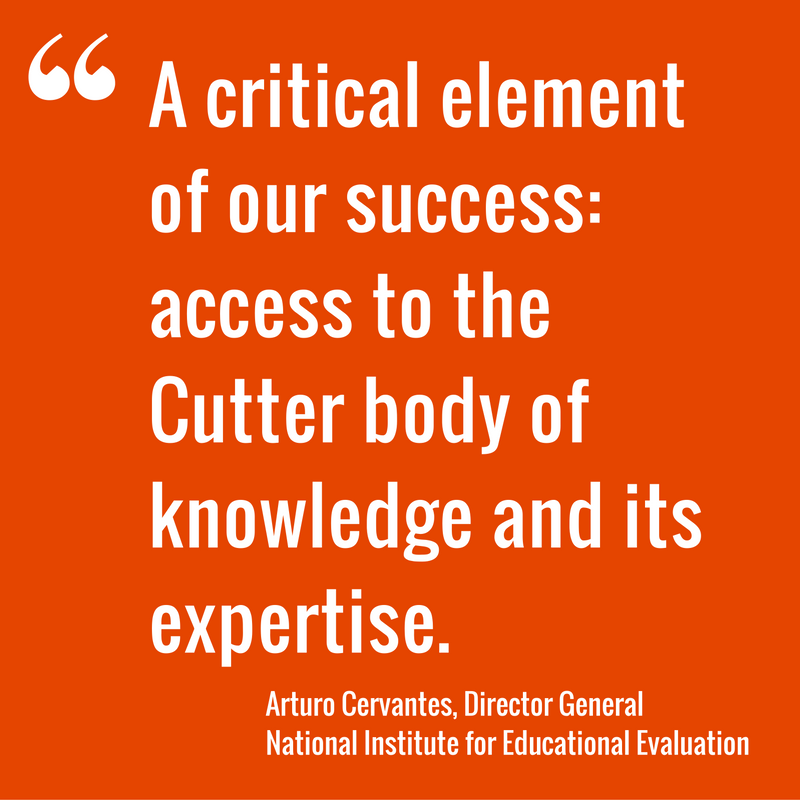Here's a Start ...
Here is a selection of recent research by Cutter experts you can access immediately. As a Cutter community member, you'll have access to every new piece of research on sustainability, technology, leadership, and industry, plus all of our timeless business and technology strategy insights. This includes more than 20 years of articles from our flagship journal, Amplify (formerly Cutter Business Technology Journal.)
Search our archives for a taste of all that's available once your subscription is activated.
Advisor
Michal Zigelman, Raz Heiferman
As this Advisor explores, AI is redefining the rules of business — accelerating both operational excellence and disruptive innovation. This dual impact forces leaders to master a paradox: optimizing today’s core while simultaneously inventing tomorrow. Success in the AI era demands more than adopting technology; it requires a new kind of leadership — one that navigates continuous tension, enables ambidexterity, and drives coordinated innovation across both stability and transformation.
Advisor
Joseph Byrum
This Advisor helps business leaders navigate the emerging challenge of AI-driven transformation thresholds—critical points where expertise shifts from scarcity to abundance. Drawing lessons from genomics and other rapidly evolving domains, it introduces a framework for recognizing when AI is poised to disrupt core capabilities and outlines strategic responses across four categories: commoditized capabilities, augmentation opportunities, transformation candidates, and resilient differentiators.
Advisor
Diaa Shalghin, Winfried Heusler
This Advisor explores how lifecycle assessment (LCA), when integrated with digital technologies like BIM, IoT, and AI, enables construction firms to measure and minimize environmental impact across a project’s entire lifecycle. By enhancing accuracy, insight, and decision-making, digital-enabled LCA supports sustainable design, regulatory compliance, and long-term efficiency from planning to end-of-life.
Article
Benjamin Herndon, Ben Szuhaj
Benjamin Herndon and Ben Szuhaj trace resilience failures not just to structural flaws but to the limits of human cognition in the face of complexity. Through lessons drawn from NASA’s Challenger and Columbia disasters, they show that true resilience depends on seeing weak signals, surfacing dissent, and learning continuously — capabilities that human-machine teaming and thoughtful AI integration can unlock. Human and machine, working together, create foresight and learning beyond any individual capability.
Article
Randal Whitlatch
Randal Whitlatch delivers a practical framework for managing today’s increasingly volatile supply chains. He demonstrates how embedding prestructured, legally sound, operationally consistent protocols transforms supply chain risk from a source of fragility into a pillar of organizational resilience. By aligning legal rigor with repeatable processes, companies can mitigate disputes, preserve commercial integrity, and sustain customer trust — critical foundations for maintaining business continuity and securing lasting advantage in uncertain times.
Article
Francois Pumir
Through candid storytelling and sharp analysis, François Pumir shows how fear-based planning, driven by old narratives and past failures, inadvertently breeds fragility instead of true readiness. He invites us to replace exhaustive frameworks with a new leadership practice rooted in clarity and direct perception, offering practical steps to cultivate a culture that responds fluidly to emergent realities. It’s a transformative reminder that true resilience starts within by shifting mindset from fear to clarity.
Article
Bill Fox
Bill Fox maps out six “territories of resilience,” from shifting societal expectations and regulatory complexity to technological and climate upheaval, and proposes four pillars that organizations can use to anchor resilient design. Fox’s article is rich with examples: logistics companies thriving through ecosystem collaboration, manufacturers succeeding by fusing user-centric design with systemic thinking, and firms reviving their foundational “why” to attract and mobilize new generations of talent. His message is clear: those who design resilience into their strategy are designing advantage in a world of constant upheaval.
Article
Alessia Falsarone
This issue of Amplify brings together leading thinkers and practitioners whose work redefines how we conceive, cultivate, and measure resilience for the challenges ahead. Their contributions illuminate how foresight, adaptability, and governance intersect to create organizations that are not only robust but regenerative. Together, they remind us that resilience is not a destination but a continuous act of design, one that equips organizations to shape, rather than merely survive, the future.
Article
Nicholas Johnson, Siddharth Pai, Olivier Pilot, Joshua Sanz, Eystein Thanisch
ADL’s Nicholas Johnson, Siddharth Pai, Olivier Pilot, Joshua Sanz, and Eystein Thanisch explore how autonomous AI agents are reshaping customer interaction, data ownership, and advertising strategies. Their findings highlight that designing for resilience is essential for retailers to stay competitive as AI agents transform the market. Original experiments carried out by the authors reveal how these AI-driven disruptions challenge traditional retail media players, underscoring the urgent need for resilience by design in the face of rapidly evolving AI ecosystems.
Advisor
Curt Hall
Cutter Expert Curt Hall explores how neuro-symbolic AI — a fusion of data-driven neural networks and rule-based symbolic reasoning — can address key limitations in today’s agentic AI systems. By combining pattern recognition and adaptability with logic, structure, and explainability, neuro-symbolic architectures enable autonomous agents to operate with greater reliability, transparency, and compliance. He highlights practical use cases where this hybrid approach mitigates risks such as hallucinations, planning errors, and opaque decision-making, laying the groundwork for trustworthy, real-world autonomy.
Advisor
Noah Barsky
In this Advisor, Noah Barsky explores three essential lenses — profit precision, ratio relevance, and cash clarity — that help leaders make smarter financial decisions. Building on prior insights, it shows how financial fluency equips executives to align strategy with reality, drive efficiency, and sustain enterprise health in an age of accelerating change.
Advisor
Michael Papadopoulos, Olivier Pilot, Eystein Thanisch
In this Advisor, ADL’s Michael Papadopoulos, Olivier Pilot, and Eystein Thanisch explore how AI’s greatest challenges in 2025 aren’t about intelligence, but context. From viral drive-through debacles to high-stakes corporate missteps, the problem isn’t capability — it’s integration. As top models plateau on benchmarks, their real-world performance often falters when they’re not tightly aligned with human workflows, norms, and systems.
Advisor
Philippa White
When people believe in what they are doing and feel a part of it, they create better customer service. When employees feel psychologically safe to innovate, they push their thinking further and happily voice their ideas. They are excited about going to work, don’t often miss work, feel like they are a part of the solution, and don’t quit. And if people aren’t leaving, then companies aren’t spending billions to replace them.
Getting It Right
So who’s currently getting this right? And what does that look like?
Advisor
Paul Godfrey, Vishal Gajjar
This Advisor follows Mary Jacobs, the newly appointed chief sustainability officer of Exactibrate Corporation, as she confronts the challenge of unifying fragmented sustainability efforts into a program that delivers both economic and societal value. Rejecting the outdated notion of a “sustainability tax,” Mary embraces a model where shareholder and stakeholder interests align. Using the Sustainability Canvas, the piece demonstrates how targeted actions across four strategic quadrants generate value, reduce risk, and strengthen competitive advantage.
Advisor
Curt Hall
This Advisor explores agentic AI — the next phase beyond generative AI — where systems not only generate outputs but also autonomously plan and execute tasks across enterprise environments. By combining LLMs with orchestration, tool integration, and feedback mechanisms, agentic AI enables end-to-end workflow automation with minimal human oversight. While the potential is substantial, technical, organizational, and governance challenges still limit deployment to early-stage pilots in most enterprises.
Advisor
Bill Fox
In this Advisor, Bill Fox traces a personal journey of purpose-driven leadership sparked by a desire to fix what’s broken in organizational change. Inspired by Steve Jobs’s belief in “connecting the dots,” he shares three pivotal steps: becoming a catalyst for change, taking small actions aligned with a larger mission, and participating in the emerging future by sharing insights. Each step illustrates how clarity and impact emerge when purpose guides action.
Advisor
Matt Mayberry, Scott Tew, Laura Asiala
This Advisor explores how Trane Technologies turned ambitious climate goals into a clear, executable strategy. Anchored by its 2030 Sustainability Commitments and the bold Gigaton Challenge, the company aligned sustainability with core business performance. By developing a robust playbook, Trane operationalized its net zero ambitions — establishing where to play, how to win, and the capabilities needed to lead on climate action.
Advisor
Myles Suer, Pedro Amorim
This Advisor explores how agentic AI — autonomous systems capable of reasoning and acting across multi-step workflows — is rapidly reshaping enterprise operations. Drawing on field research and market signals, it distinguishes between firms embedding agents into core processes and those stalled in pilot purgatory due to fragmented data and governance. Early winners aren’t just using better models; they’re better prepared — with mature data pipelines, governed toolchains, and institutionalized knowledge.
Advisor
Noah Barsky
While often overshadowed by buzzwords and tech trends, financial literacy enables leaders to spot early distress signals, assess business health, and make grounded decisions. This Advisor presents two enduring insights: first, while earnings drive headlines, it’s the balance sheet that determines survivability — highlighting the importance of stewardship over growth at any cost. Second, that sales growth rate serves as a company’s “speed limit,” providing critical context for interpreting operational changes and ensuring strategic alignment. In times of transformation, disciplined financial insight remains a leader’s most dependable tool.
Advisor
Ali Ayach, Farhan Mirza
In this Advisor, ADL’s Ali Ayach and Farhan Mirza explore how the healthcare sector can embrace sustainability without compromising care quality or patient experience. It highlights the role of green technologies, international standards, and cross-industry collaboration in reducing environmental impact. Case studies from leading hospitals and health systems demonstrate tangible benefits — such as cost savings, emission reductions, and operational efficiencies — while national action plans in the US and UK reinforce a global drive toward net zero healthcare.






















